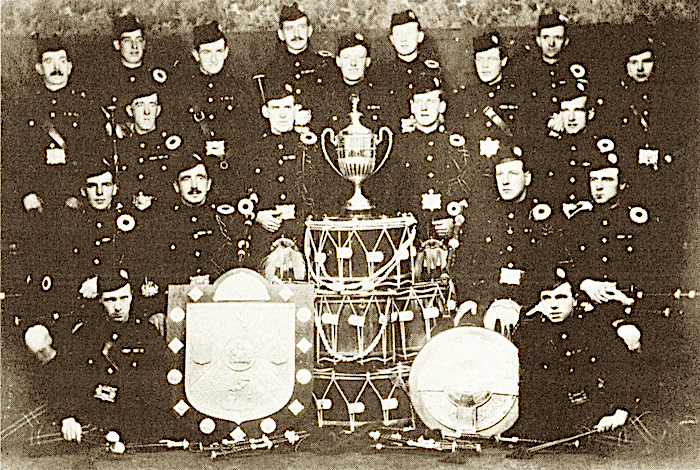
Farquhar MacRae (1859-1916), winner of the Gold Medal in 1898, was a member of the (Blythswood) Highland Light Infantry (3rd Volunteer Battalion HLI) from the 1880s and for many years thereafter he was pipe major.
Towards the end of 1908 this battalion was renumbered, becoming the 7th Volunteer Battalion HLI. That year, at Cowal Games his band placed fifth in the Argyll Shield Open Competition (World Championship), just one example of the many successes of the band during Pipe Major Farquhar MacRae’s tenure.
By Iain Duncan
It was in 1913 that the band won the competition outright, becoming World Champions. That year, after the TA Annual Camp, he resigned from the Territorials and formed the City of Glasgow Pipe Band (pictured above), which was to be the first incarnation of the Clan MacRae Society Pipe Band, taking with him the majority of the membership of the 7th Battalion Band; such was their regard for the pipe major.
It was this esteem for the man, and his clan which made the band’s choice of tartan straightforward, Hunting MacRae, although the source of their funding remains unknown. In the spring of 1914 the band placed second at the Glasgow Corporation Pipe Band Contest, the new band’s first taste of competition success.
Note the side drums; this style of drum came to be the preferred model for the majority of bands of this era. They were produced by Henry Potter & Co. Ltd of Aldershot and although tenor drums began to appear from around 1910 it took some years for the majority of bands to adopt them.
On 4th August, 1914, Britain entered World War I and consequently, like bands throughout the land, the band went into a recession. The country was two years into the war when Farquhar MacRae passed away during the spring of 1916, aged 57.
The World War ended on 11th November, 1918, however it would take a considerable time for life to return to some semblance of pre-war. The death of their pipe major during the war years was a devastating blow to the former bandsmen.
One of Farquhar MacRae’s star pupils who played under his leadership in the 3rd VB HLI and the 7th VB was one William Fergusson (1885-1949). William originally hailed from Arbroath, son of a shoemaker. He moved to Glasgow with his parents whilst still quite young and was taught the pipes by Pipe Major Hutcheson after joining the 102nd (Govan) Glasgow Company Boys’ Brigade , then, more seriously, by Farquhar MacRae when he joined the 3rd VB HLI in 1901.
Going into war, he was appointed Pipe Major of the 7th HLI. He served in Gallipoli, Palestine and France and was also given charge of the 52nd Divisional Pipe Band in Egypt.
On 1st April, 1920 the City of Glasgow Pipe Band was reconvened, and by popular choice William Fergusson was appointed pipe major. He was down-to-earth and his theoretical and practical knowledge of the bagpipe and the running of a pipe band were second to none. He possessed a somewhat charismatic talent and instilled confidence throughout the band and moving into the 1920s the band won the Cowal World Pipe Band Championship in three consecutive years, from 1921 to 1923.
The spirit of Farquhar MacRae (r) still loomed in the background. Willie Fergusson had composed the two parted 2|4 march, Farquhar MacRae, and the band wore Hunting MacRae tartan in his honour. It’s likely that it was soon after their triple consecutive Cowal World Championship titles at the end of 1923, in a truly inspired act of PR, that the band approached Captain John Duncan George MacRae at his Ballimore Estate, near Otter Ferry on the west coast of Loch Fyne, to become its president, and announced their intention to officially rebrand as Clan MacRae Society Pipe Band.
Captain John was the son of Lt. Col. John MacRae-Gilstrap, Royal Highlanders and Isabella Mary Gilstrap, the niece and co-heiress of Sir William Gilstrap, and their match was conditional on the Lt. Col. adopting the additional surname Gilstrap. The Gilstrap family had the largest malt-producing business in Britain.
To seal the new band arrangement, William Fergusson was asked to compose a competition standard 2|4 march. The Clan MacRae Society was the result and it is a tune still popular with today’s bands. The band also changed tartan to the Red MacRae (with a unique small sett) and they opened 1924 as The Clan MacRae Society Pipe Band making quite an impact that year.
- To be continued.
-
Bagpipes – DN4A – High Quality Set in Plain SilverPrice range: £200.00 through £2,052.00
-
Bagpipes – DN5 – The Finest Bagpipe AvailablePrice range: £300.00 through £3,424.00
-
Bagpipes – DN1, High Quality InstrumentPrice range: £100.00 through £1,250.00